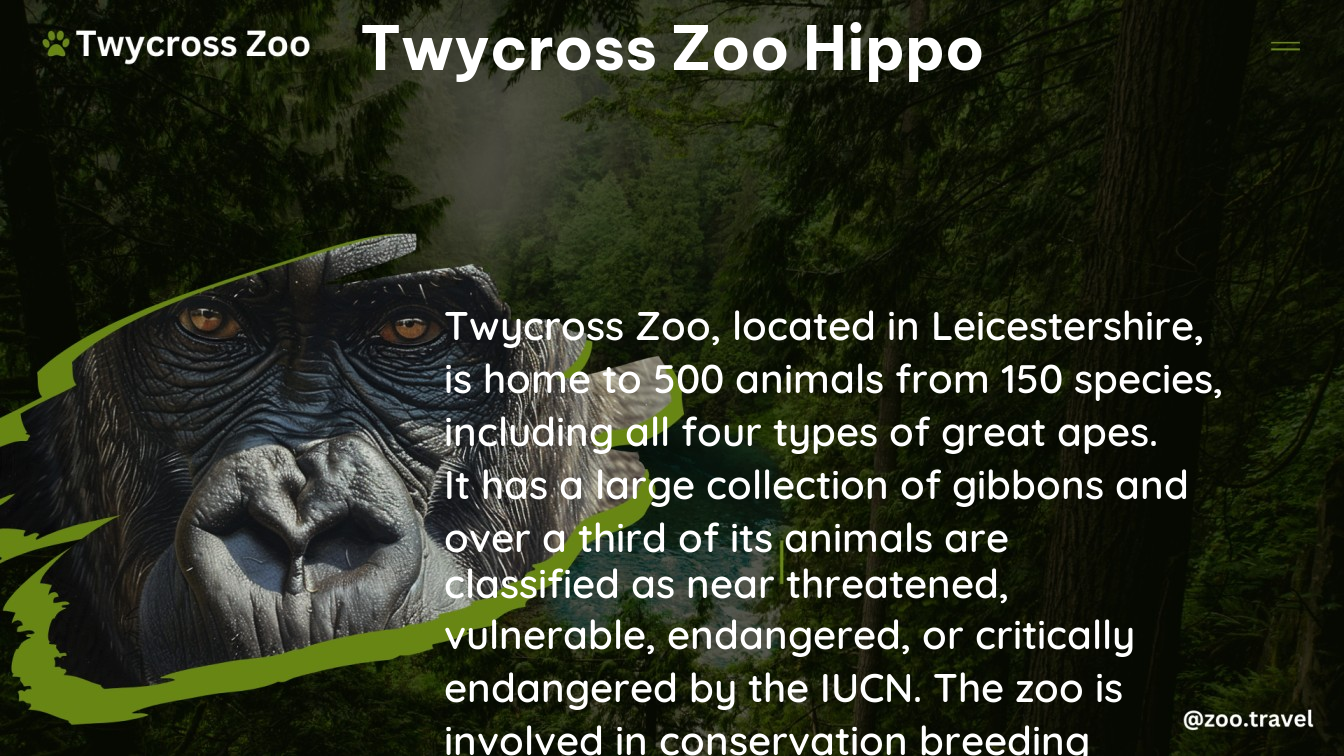Twycross Zoo is a renowned wildlife sanctuary located in Leicestershire, UK, known for its impressive collection of primates and other fascinating species. However, one notable absence from the zoo’s diverse animal population is the iconic hippopotamus. While Twycross Zoo boasts an array of captivating exhibits, the lack of these semi-aquatic giants has left many visitors curious about the reasons behind this decision.
The Absence of Hippos at Twycross Zoo
Twycross Zoo is home to a vast array of animals, from the majestic Amur leopards to the playful siamangs and the gentle aldabra giant tortoises. Yet, despite the zoo’s reputation for housing a diverse range of species, the absence of hippos is a curious fact that has piqued the interest of many zoo enthusiasts.
Reasons for the Lack of Hippos
There are several potential reasons why Twycross Zoo has chosen not to exhibit hippos. One of the primary considerations is the specific habitat requirements and care needs of these large, semi-aquatic mammals. Hippos require spacious enclosures with deep pools of water, as well as a carefully managed diet and specialized veterinary care. The logistics and resources required to maintain a healthy and thriving hippo population may not align with the zoo’s current focus and capabilities.
Additionally, the conservation status of hippos may also play a role in the decision-making process. While the common hippopotamus is classified as “Vulnerable” on the IUCN Red List, some subspecies, such as the Pygmy hippopotamus, are considered “Endangered.” Zoos often prioritize the conservation of species that are more critically threatened, and the limited resources may be directed towards those efforts.
Visitor Experience and Exhibit Diversity
While the absence of hippos may disappoint some visitors, Twycross Zoo has made a conscious effort to provide a diverse and engaging experience for its guests. The zoo’s focus on primates, including the four great ape species, as well as its commitment to conservation and education, have earned it a reputation as a leading wildlife sanctuary.
By not exhibiting hippos, Twycross Zoo can dedicate its resources to maintaining and enhancing the well-being of the animals in its care, as well as investing in conservation initiatives that align with its mission and values.
Twycross Zoo’s Conservation Efforts

Twycross Zoo is not only a place for visitors to marvel at the wonders of the animal kingdom but also a hub for conservation and research. The zoo is actively involved in various conservation breeding programs, working to ensure the survival of endangered species both locally and globally.
Conservation Breeding Programs
Twycross Zoo is a member of several prestigious organizations, including BIAZA, EAZA, and WAZA, which are dedicated to promoting the welfare and conservation of animals worldwide. The zoo’s participation in these networks allows it to contribute to coordinated efforts to protect threatened species, such as the Amur leopard and the siamang.
The Conservation Welfare Fund
In 2006, Twycross Zoo established the Conservation Welfare Fund, a dedicated initiative aimed at making a positive impact on animal conservation and welfare globally. This fund has supported over 55 conservation and welfare projects in 27 different countries, demonstrating the zoo’s commitment to making a tangible difference in the lives of animals.
Visitor Experiences and Educational Opportunities
While the absence of hippos may be a point of interest for some visitors, Twycross Zoo offers a wealth of other engaging experiences and educational opportunities.
Diverse Animal Exhibits
The zoo’s animal exhibits are divided into eight distinct zones, each showcasing a unique collection of species. From the majestic Amur leopards to the playful siamangs and the gentle aldabra giant tortoises, Twycross Zoo provides visitors with the chance to encounter a wide variety of fascinating creatures.
Educational Programs and Workshops
Twycross Zoo is dedicated to educating visitors about the natural world and the importance of conservation. The zoo offers a range of educational programs, workshops, and interactive experiences that cater to visitors of all ages, from school groups to families and individuals.
Conclusion
While Twycross Zoo may not be home to the iconic hippopotamus, the zoo’s commitment to conservation, animal welfare, and providing a diverse and engaging visitor experience is undeniable. By focusing its resources on the species it can best support and care for, Twycross Zoo continues to be a leading wildlife sanctuary and a beacon of hope for the preservation of endangered species worldwide.
References:
– Twycross Zoo Official Website
– Twycross Zoo FAQs
– Wikipedia – Twycross Zoo
– ZooChat – Twycross Zoo News 2024
– Twycross Zoo – Animals
